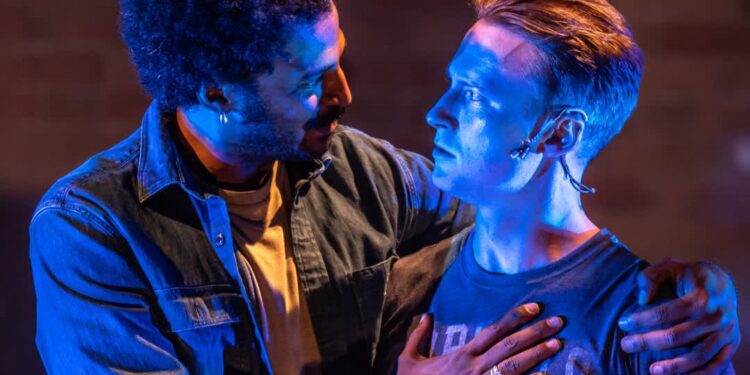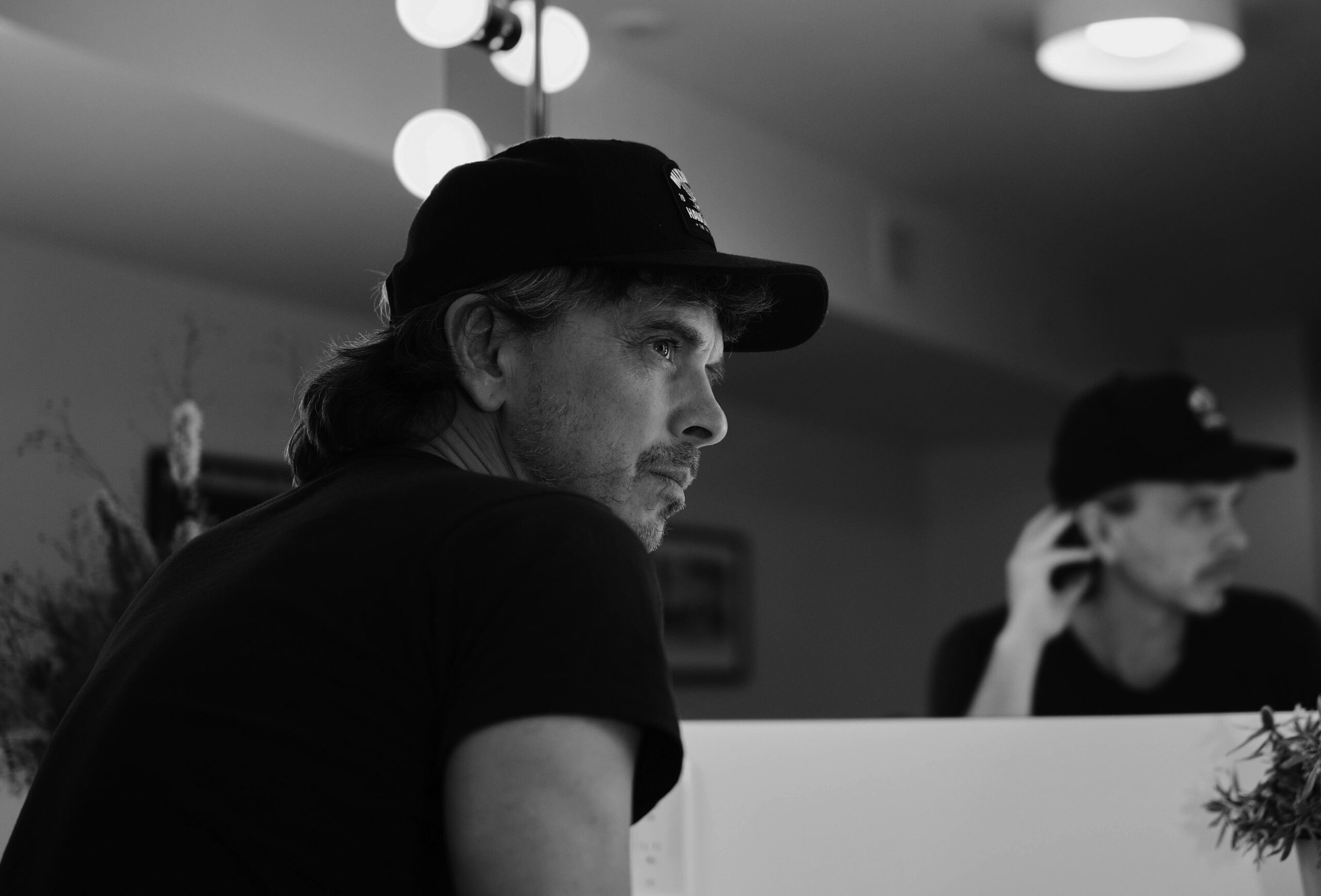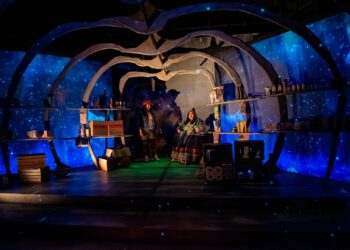A deeply resonating tale of musical fusion through the respect and friendship between Director Seth Bockley and performers Jesse LaVercombe and Ahmed Moneka. It’s not necessary to understand the lyrics of the singing. It’s the joy that emanates from watching Moneka, his band, and LaVercombe play with precision and love for their respective cultures.
Listening, hearing, and understanding are essential for a symbiotic fusion between cultures. Add song and music, and this harmonious sound deepens the experience even more.
That’s precisely what King Gilgamesh and the Man of the Wild is all about. We need to listen, hear, and understand as closely as possible to bridge the connection to cultures.
Inspired by the world’s oldest story, “The Epic of Gilgamesh,” a king and a beast-man find meaning in life through their connection with each other. They teach one another about strength and vulnerability. In the Soulpepper/TRIA Theatre script by Bockley, LaVercombe, and Moneka, two men from different cultures (LaVercombe and Moneka) find a common connection, despite their cultural differences, as an ex-pat American Jew now living in Canada and an Iraqi Muslim. They meet in a coffee shop. Moneka (whose girlfriend is expecting their child soon) works as a barista. LaVercombe, an actor, is on the phone with his agent about a film shoot in Los Angeles with a well-known Hollywood actor. As Moneka is also an actor, this shared interest initially opens up a line of communication between the men. Surprisingly, neither of them expected this gift of friendship. Jesse realizes that this call to Hollywood is a crucial one for his career.
At one point, Ahmed starts to share the story of Gilgamesh with Jesse, explaining that its themes are essential not only for the life of an actor but also for the characters in the tale. In this production, Ahmed will portray Gilgamesh, while Jesse will play the man-beast, alternating with scenes where they play themselves in the present.
Two intriguing aspects of this production stand out. First, the city of Toronto becomes an integral part of the story of Gilgamesh, unfolding before the audience. Second, Moneka’s real-life Juno-nominated Arabic jazz band provides music and lyrics that enhance the intense emotions between Gilgamesh/the Beast and Moneka/LaVercombe. One doesn’t need to understand the lyrics of every moment sung. Instead, just experience and breathe in the spirit of individuals who love playing and sharing in music.
Lorenzo Savoini designs the sparse set with earthy tones that evoke the colours of fall. An apt choice to make given the variety of colours at this time of year. The look is visually striking. Center stage, a table serves as both the coffee shop and various locations within Gilgamesh’s kingdom. Behind the table, members of Moneka’s jazz band are seated. To the left of the table, LaVercombe plays the piano, accompanying Moneka’s band. The sound design by Adrian Shepherd-Gawinski and sound engineering by Fote Vatilevski play crucial roles, particularly when Moneka and LaVercombe share Gilgamesh’s story through their performances.
Director Seth Bockley emphasizes the deep intimacy of friendship between Moneka and LaVercombe, ‘brothers from other mothers’, showcasing the connection as the highest form of love between individuals, without any implications of sexual undertones. This profound friendship is also evident between Gilgamesh and his companion. When Gilgamesh faces the grief of losing his friend, it is clear that a strong bond exists between these two men. This similar bond also suggests that Ahmed and Jesse would be there for each other in an instant if either were in need. Yes, there is some frank discussion of sexual content between the two men, and there is mature language throughout. That’s how men who are in sync with other men converse with each other.
Moneka and LaVercombe are the reasons to see the production. They’re genuine and realistic in listening and responding to each other.
Along with their physical agility in moving around the stage with purpose and reason, the two celebrate each other and want to find out more about the other person and why they are who they are. There is one point where Jesse is in Los Angeles on the film set with a noted Hollywood celebrity (I won’t reveal who it is, as that’s all part of the fun). Moneka assumes the role of the character. When Jesse returns to Toronto, Ahmed asks him if he has ever finished learning more about Gilgamesh. Jesse says he was puzzled by something, and he wants Ahmed to explain what’s confusing. Ahmed gladly does so.
There’s an immutable connection between two men.
The programme contains a wonderful tribute to the bonds of friendship as sacred and as vital as romance. It helps us become our most authentic selves. When one has that, it’s cause for celebration, no matter the culture or language difference. It’s a connection that friendships become our witnesses in the journey of life.
That’s another reason to see King Gilgamesh and the Man of the Wild.
Running time: approximately 90 minutes with no interval/intermission.
King Gilgamesh and the Man of the Wild runs to October 5 at the Young Centre for the Performing Arts, 50 Tank House Lane, in Toronto’s Distillery District. For tickets: soulpepper.ca, youngcentre.ca or email: boxoffice@youngcentre.ca
SOULPEPPER and TRIA THEATRE present
King Gilgamesh and the Man of the Wild by Jesse LaVercombe, Seth Bockley and Ahmed Moneka
Directed by Seth Bockley
Lighting and Set Designer: Lorenzo Savoini
Sound Designer: Adrian Shepherd-Gawinski
Sound Engineer: Fote Vatilevski
Dramaturg: Guillermo Verdecchia
Stage Manager: Emilie Aubin
Band: Demetrios Petsalakis, Waleed Abdulhamid, Jessica Deutsch, Selcuk Suna, Max Sennit Raha Javanfar, Roberto Riverón
Performed by Ahmed Moneka and Jesse LaVercombe
















